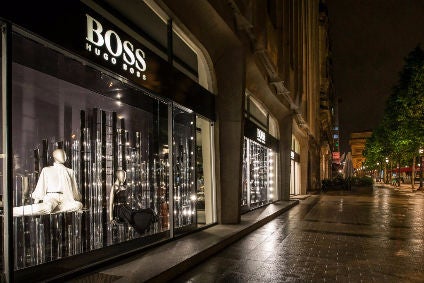
Hugo Boss has reported results for the three months ending 31 March:
- Currency-adjusted group sales up 52% to EUR772m (US$763.9m) marking the strongest first quarter in the history of Hugo Boss from a top-line perspective. In group currency, revenues increased 55%.
- Operating profit (EBIT) amounted to EUR40m in Q1, up from EUR1m a year prior.
- Gross margin was up 120 basis points to 61.6%, mainly reflecting a higher share of full-price sales, which was partly offset by persistently high levels of global freight and transportation costs.
- Top- and bottom-line outlook for full-year 2022 confirmed. Accordingly, the group continues to expect sales in 2022 to increase between 10-5% to a new record level of between EUR3.1-EUR3.2bn.
“We have made a kickstart to fiscal year 2022, with record first-quarter sales,” says Daniel Grieder, CEO of Hugo Boss. “Supported by our bold branding refresh, momentum for Boss and Hugo has accelerated around the globe. Together with the ongoing rigorous execution of our Claim 5 strategy, this provides us with strong tailwinds to achieve record sales in fiscal year 2022.”
Commenting on the numbers, Louise Deglise-Favre, associate apparel analyst at Global Data, says Hugo Boss’ well-executed rebranding strategy allowed it to secure an excellent first quarter, with currency-adjusted sales rising 17% against pre-pandemic levels to EUR772m.
“The rebrand, introduced in January 2022, included two global star-studded campaigns, a complete website revamp, and a shift toward more casual designs. This enabled the group to grow its operating profit by EUR39m despite doubling its marketing investment, as consumers rushed to purchase the new designs at full price. This helped protect the group’s margins against supply chain cost increases, placing Hugo Boss in a good position for the rest of the year. The group expects its FY2022 sales to grow between 10 and 15%, driven by the momentum of its brand refresh and despite the increasing pressure on consumers’ discretionary incomes.
“The group’s growth was driven by its key markets of Europe and the Americas, growing 21% and 17% respectively against Q1 FY2019 on a currency-adjusted basis, boosted by the success of its brand refresh. The campaigns resonated well in both regions due to the heavy representation of European and American celebrities and athletes, such as Hailey Bieber, Kendall Jenner, and Anthony Joshua. However, tighter Covid-19 restrictions in China towards the end of the quarter, combined with minimal representation of APAC celebrities in the group’s latest campaigns, stunted growth in the region, with sales remaining 1% below Q1 FY2019.
“Hugo Boss’ currency-adjusted online sales (including on third-party websites) grew 22% in Q1 FY2022, despite being against a strong comparative due to the widespread lockdowns in Europe. This can partially be explained by the group’s low pre-pandemic online penetration, but it is also a testament to the success of the group’s rebranding and investment in its online proposition.

US Tariffs are shifting - will you react or anticipate?
Don’t let policy changes catch you off guard. Stay proactive with real-time data and expert analysis.
By GlobalData“Hugo Boss is continuing to focus on its digital presence to appeal to Gen-Z consumers and grow its online penetration (currently 20%), such as inviting TikTok creators to stay in its temporary Hugo House in Palm Springs during the infamous Coachella festival and collaborating with social media stars, such as Khaby Lame, to promote its products and boost brand awareness. However, Hugo Boss still has more work to do to fully establish itself as a key brand among Gen-Z.
“Its recent announcement that it is entering the resale market later this year will undoubtedly boost its sustainability credentials, an important factor for younger consumers.”
Last month, Frasers Group increased its investment in Hugo Boss again, in a move it says reflects its belief in the German luxury fashion brand, strategy and management team.



